|
|
|
Sort Order |
|
|
|
Items / Page
|
|
|
|
|
|
|
| Srl | Item |
| 1 |
ID:
134217
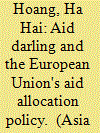

|
|
|
|
|
| Publication |
2014.
|
| Summary/Abstract |
This paper analyses the motivation determining the European Union's (EU) aid allocation to Vietnam. Existing literature and EU official documents are used to build upon four models with respect to new aid allocation: donor interest, recipient interest, recipient capacity and potential donor influence. The paper concludes that the EU's aid policy in Vietnam has a long-term objective in conformity with Vietnam's development strategy-poverty alleviation. Moreover, the EU's political and economic interests, a successful economic reform and development strategy, a high level of ownership (good governance) and potential donor influence are identified as contributions to make Vietnam an 'aid darling'.
|
|
|
|
|
|
|
|
|
|
|
|
|
|
|
|
| 2 |
ID:
133689
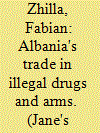

|
|
|
|
|
| Publication |
2014.
|
| Summary/Abstract |
With a new movement attempting to get to grips with organized crime in Albania. Fabian Zhilla examines trends in drug trafficking into Europe and the growth in contract killings arising from a developing market in arms and explosives.
|
|
|
|
|
|
|
|
|
|
|
|
|
|
|
|
| 3 |
ID:
127061
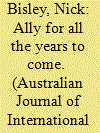

|
|
|
|
|
| Publication |
2013.
|
| Summary/Abstract |
In 2011, Australia communicated a clear choice about its strategic future. It would continue to cleave tightly to the US alliance, expand its military links and work to advance the USA's conception of regional order. Given its economic interests, why has Australia bound itself to the US alliance? What lies behind this strong commitment and what would it take for Australia to change its relationship with the USA? This article presents an analysis of the current state of the US-Australia alliance and argues that Canberra's pursuit of close relations with the USA reflects the interaction of a rational calculation of the costs and benefits of the alliance with a set of resolutely political factors that have produced the current policy setting. The article first assesses the security cost and benefit behind the alliance. It then argues that the move also derives from the strong domestic support for the US alliance, a sharpened sense that China's rise was generating regional instability that only the US primacy could manage and the realisation that the economic fallout of such a move would be minimal. It concludes with a brief reflection on what it might take to change the current policy settings.
|
|
|
|
|
|
|
|
|
|
|
|
|
|
|
|
| 4 |
ID:
137226
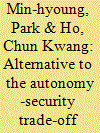

|
|
|
|
|
| Summary/Abstract |
Most of the alliances that were formed during the Cold War period were known as a so-called “asymmetric alliance,” which means strong states provide one-sided support for the partner in a relationship at the expense of the weaker power’s autonomy. In an asymmetric alliance, a weak state gets full security support from the superpower, but in return, the weak state loses its autonomy. In this case, there is a trade-off between security and autonomy of the weaker state. This is what the Autonomy-Security Trade-off Model suggests. However, after the end of the Cold War, the weak powers, especially the developing country, have tried to increase its autonomy without any loss of its security—unlike what the Autonomy-Security Trade-Off Model argues. In this case, there may not be necessarily a trade-off between autonomy and security if a weak state decides to increase both autonomy and security simultaneously. The weak state does not usually want to lose its security, therefore it tries to find a strategy that can increase its autonomy without decreasing its security. In this sense, this paper argues that the Autonomy-Security Trade-off model has limitations to explain the above kind of national action after the Cold War. In line with this, the goal of this paper is to offer an alternative model to explain an asymmetric alliance relationship by looking at the case of the
ROK-U.S. alliance at the turn of the twenty-first century.
|
|
|
|
|
|
|
|
|
|
|
|
|
|
|
|
| 5 |
ID:
127907


|
|
|
|
|
| Publication |
2014.
|
| Summary/Abstract |
This paper introduces a new agent-based model, which incorporates the actions of individual homeowners in a long-term domestic stock model, and details how it was applied in energy policy analysis. The results indicate that current policies are likely to fall significantly short of the 80% target and suggest that current subsidy levels need re-examining. In the model, current subsidy levels appear to offer too much support to some technologies, which in turn leads to the suppression of other technologies that have a greater energy saving potential. The model can be used by policy makers to develop further scenarios to find alternative, more effective, sets of policy measures. The model is currently limited to the owner-occupied stock in England, although it can be expanded, subject to the availability of data.
|
|
|
|
|
|
|
|
|
|
|
|
|
|
|
|
| 6 |
ID:
131029
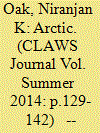

|
|
|
|
|
| Publication |
2014.
|
| Summary/Abstract |
Regionalism as a political project has been a signi?cant phenomenon in post-1945 international relations. The third phase of regional integration began towards the end of the 19805 within the international context created by the end of the Cold War. Academics dubbed it as "new regionalism".' Most of the regional organisations that came up in those days were based on economic cooperation among the states. It was an era of globalisation. The Arctic Council (AC) which emerged in 1996 was a unique case. The 'Arctic' has emerged as a region in international cooperation during the past 20-30 years, as manifest in the creation of the AC. The objective of the AC was sustainable development and environmental protection only, and that is why it may be termed as a unique case in that period.
|
|
|
|
|
|
|
|
|
|
|
|
|
|
|
|
| 7 |
ID:
132308
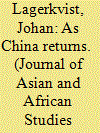

|
|
|
|
|
| Publication |
2014.
|
| Summary/Abstract |
This article investigates how perceptions of China in Mozambican civil society are affected by entrepreneurial activity and bilateral cooperation between China and Mozambique - real, imagined, visible and legal as well as clandestine and illegal in the agricultural and forestry sectors. The research problem concerns how discourse on Chinese investors is formed in Mozambique. Two questions are posed. How does Mozambican civil society perceive their room to maneuver at a time of Chinese growing economic interest and 'return' to Africa? What views exist on the policy space for the national government? Using qualitative ethnographic interviews to answer these overarching questions about expanding/contracting maneuvering space, this article explains how Mozambique's largest social group - peasants - the National Association of Small Farmers (UNAC) and other societal actors perceive Chinese investors. Informed by theoretical debates on civil society, the article argues that coinciding with China's large-scale return to Africa, an already tense dynamic between civil society and the state is picking up speed. It is argued that this phenomenon is likely to have more to do with African governments accruing more power and policy space than through direct impact of Chinese economic activity on African social life. However, to avoid negative discourse formation, China and host governments need to become more open on and transparent about bilateral agreements.
|
|
|
|
|
|
|
|
|
|
|
|
|
|
|
|
| 8 |
ID:
130606
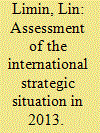

|
|
|
|
|
| Publication |
2014.
|
| Summary/Abstract |
The international strategic situation in 2013 appeared very calm than ever before and had no outstanding features; the fact of its having no special feature was its de?ning characteristic. Although 2013 could be
characterized as a normal year, the international strategic situation has undergone some profound changes. One of the most important is that the United States may have quietly given up its role of the "world police." The 'post-American era' has begun to arrive without attracting much attention in the international community. Many of these profound changes, including the long-term downturn of the world economy, the ongoing process of the West 's decline and the rise of the East, the endless chaos in the Middle East, readjustments in the international order and great power relations, and the evolving relationship between China and the U.S. are all closely related with this dawning of the 'post-American era.' Thus, the 2013
international strategic situation could be seen as holding the seeds of greater change than has been seen since the collapse of the Soviet Union in 1991.
|
|
|
|
|
|
|
|
|
|
|
|
|
|
|
|
| 9 |
ID:
127283
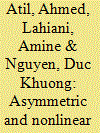

|
|
|
|
|
| Publication |
2014.
|
| Summary/Abstract |
In this article, we use the recently developed nonlinear autoregressive distributed lags (NARDL) model to examine the pass-through of crude oil prices into gasoline and natural gas prices. Our approach allows us to simultaneously test the short- and long-run nonlinearities through positive and negative partial sum decompositions of the predetermined explanatory variables. It also offers the possibility to quantify the respective responses of gasoline and natural gas prices to positive and negative oil price shocks from the asymmetric dynamic multipliers. The obtained results indicate that oil prices affect gasoline prices and natural gas prices in an asymmetric and nonlinear manner, but the price transmission mechanism is not the same. Important policy implications can be learned from the empirical findings.
|
|
|
|
|
|
|
|
|
|
|
|
|
|
|
|
| 10 |
ID:
084885
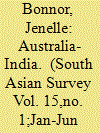

|
|
|
|
|
| Publication |
2008.
|
| Summary/Abstract |
The Australia-India relationship has reached its strongest point for many years, but it is poised at the edge of a difficult issue that may undermine all the hard work. Economic relations are very robust, with Australia's energy supplier role being increasingly important to India. Mutual strategic interests in Asia, the Indian Ocean and counter-terrorism dictate greater focus on the underdeveloped security relationship. But it is the tricky matter of uranium sales that is the big issue in bilateral relations. It has the potential to create a major rupture if a mature accommodation is not reached. Australia and India could develop a stronger and broader partnership that will benefit both but the uranium issue will be a significant challenge to overcome on the way.
|
|
|
|
|
|
|
|
|
|
|
|
|
|
|
|
| 11 |
ID:
133692
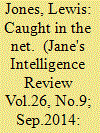

|
|
|
|
|
| Publication |
2014.
|
| Summary/Abstract |
Although the risk of conflict over fisheries stocks in the South Pacific is currently low, increasing demand will test existing conversation measures. Lewis Jones examines the potential for confrontations and China seeks to play a larger role in Pacific Fishing.
|
|
|
|
|
|
|
|
|
|
|
|
|
|
|
|
| 12 |
ID:
128117
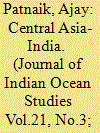

|
|
|
|
|
| Publication |
2013.
|
| Summary/Abstract |
Revival of the 'Silk Road' or Silk Road Strategy is a fashionable terms now days, even in Indian academic circles. Of course the word has been used more extensively by American and Chinese scholars. This began with the US Silk Road Strategy act of 1999, which talked of transporting the Central Asian region's natural resources to the international market.
|
|
|
|
|
|
|
|
|
|
|
|
|
|
|
|
| 13 |
ID:
128284
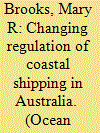

|
|
|
|
|
| Publication |
2014.
|
| Summary/Abstract |
Market access to coastal shipping services is often severely restricted. Most countries impose national flag requirements as a minimum. However, Australia's coastal shipping market has been more open than many other markets, allowing foreign flag access to domestic shipping through a unique permit and licensing scheme. This article assesses Australia's regulation of cabotage by examining the nature of the permits issued to foreign flag companies for domestic shipments and evaluates the changes currently being proposed against a database of permits issued in 2009 and 2010.
|
|
|
|
|
|
|
|
|
|
|
|
|
|
|
|
| 14 |
ID:
155019
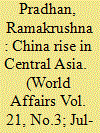

|
|
|
|
|
| Summary/Abstract |
The fight for hegemony in Central Asia is age old and the new Belt and Road Initiative has dramatically underscored the region’s strategic value to the West and opened up a bonanza for Chinese economic, political and security interests. Ramakrushna Pradhan analyses China’s emergence and interests in Central Asia and the implications for future developments in the region. He also explores the possibility of the Belt and Road Initiative becoming the new lever of the balance of power in Eurasia.
|
|
|
|
|
|
|
|
|
|
|
|
|
|
|
|
| 15 |
ID:
130608
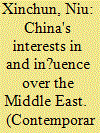

|
|
|
|
|
| Publication |
2014.
|
| Summary/Abstract |
The Middle East became a critical region for China after 1993, when The Beijing became a net oil importer. From this point, it became enmeshed in the complicated regional situation. And so China must realize its basic interests and policy objectives in the Middle East as well as set up an overall, balanced, clear and long-term strategic framework. Policy choices should be made in accordance with such factors as diplomatic tradition, national strength and political ideology
|
|
|
|
|
|
|
|
|
|
|
|
|
|
|
|
| 16 |
ID:
127279
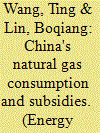

|
|
|
|
|
| Publication |
2014.
|
| Summary/Abstract |
China's natural gas consumption is growing rapidly and it has being driven by economic growth, industrialization and urbanization. In addition, the country's low-carbon development strategy, government-controlled gas price, and some other factors also contribute to the surging gas consumption. This paper studies China's natural gas consumption in residential, industrial and commercial sectors. We adopt the cointegration test and error correction model to study the relationships of explanatory factors and gas consumption of different sectors and climate factor is included into the analysis. In order to find the direction of natural gas pricing reform and establish the benchmark gas price, this paper also estimates the size of gas price subsidy by using price-gap approach. Our findings are as follows: In the long term, China's residential sector is more sensitive to price than the other two. Urbanization is an important factor promoting industrial and commercial gas consumption. Prices of other energies have an influence on natural gas consumption significantly due to the substitutability between energies. The slow-moving and unsatisfying pricing reforms on refined oil and natural gas lead to positive price elasticity of natural gas in the commercial sector, which implies that a further energy price reform is still stringent for China.
|
|
|
|
|
|
|
|
|
|
|
|
|
|
|
|
| 17 |
ID:
137185
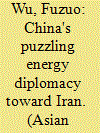

|
|
|
|
|
| Summary/Abstract |
China, the world's largest energy consumer, has sought to build up its ties with all energy-rich countries. But China's energy diplomacy toward Iran, one of its largest oil suppliers, is puzzling. On the one hand, China has gone all out to strengthen its ties with Iran in spite of international efforts to isolate Iran because of its controversial nuclear program. On the other hand, China not only has voted against Iran at the International Atomic Energy Agency and the United Nations Security Council on the nuclear issue, but also has cut its oil imports from Iran. The main explanation for this apparent contradiction is US pressure. China has yielded to the pressure because the United States and its allies are much more important for China's economic development and energy security than is Iran.
|
|
|
|
|
|
|
|
|
|
|
|
|
|
|
|
| 18 |
ID:
133975
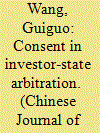

|
|
|
|
|
| Publication |
2014.
|
| Summary/Abstract |
Consent is a precondition of arbitration, regardless of whether it is between private parties to commercial transactions or a foreign investor and its host State. Consent determines the formation and competence of arbitration tribunals. It is therefore a foundation of the investor-State arbitration system. By its very nature, privity is not required in investor-State arbitration, albeit consent is essential to prove that the tribunal in question is bestowed the power to arbitrate. In addition, consent to arbitration may be given by the host State and the foreign investor at different times. It is often the case that the host State will give consent first, which is regarded as a standing offer. The acceptance of this offer by the investor, and thus its own consent, may be accomplished by its filing of a request for arbitration or by direct notification to the respondent State. Due to the variety of treaties coupled with contracts between foreign investors and host States, whether or not a host State has given consent to arbitration and the scope of the consent is often at issue. As far as the form of consent is concerned, most arbitration rules do not stipulate what may constitute a valid consent. For instance, the Convention on the Settlement of Investment Disputes between States and Nationals of Other States ('ICSID Convention') requires consent to arbitration to be in writing. It does not, however, further provide the requirements of writing. In such circumstances, disputing parties have the freedom to choose the manner of expressing their consent. In the circumstances, investment arbitration tribunals are left with much discretion in determining whether consent has been given and its validity as well as its scope. Because of this situation, the decisions of investment arbitration tribunals sometimes trigger criticisms. This article is going to examine the most relevant cases for the purpose of ascertaining the current status of investment law in operation.
|
|
|
|
|
|
|
|
|
|
|
|
|
|
|
|
| 19 |
ID:
085676


|
|
|
|
|
| Publication |
2008.
|
| Summary/Abstract |
Crises and interventions often generate opportunities for profitable business activities. This can have a significant effect on the outcomes of interventions. This article explores how economic interests can create crises and how the nature of interventions may be shaped by business interests. It looks further at the macroeconomic consequences of crises, the possibilities of corruption and neo-imperialism. Reference is made to examples of crises and interventions that illustrate these political economic concerns.
|
|
|
|
|
|
|
|
|
|
|
|
|
|
|
|
| 20 |
ID:
129089


|
|
|
|
|
| Publication |
2014.
|
| Summary/Abstract |
As China's economic and political presence in Africa increases, so does the need for its government to maintain a favorable image with African publics. Borrowing theories of soft power diplomacy and language planning, this paper analyzes, from the perspectives of African and Chinese policymakers, the impact of the Confucius Institutes on higher education in Africa and its intersections with language planning and cultural diplomacy. An empirical case study at the University of Nairobi Confucius Institute shows that policymakers and administrators anticipate that a competent group of Kenyans with Mandarin language skills will be able to engage with Chinese people and Chinese-owned companies on the ground in Kenya. However, Chinese diplomats are more concerned with China's image and achieving its political and economic interests in Kenya than with effective cultural exchange and language instruction.
|
|
|
|
|
|
|
|
|
|
|
|
|
|
|
|
|
|
|
|
|